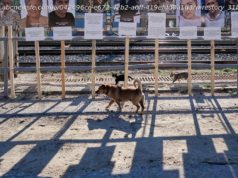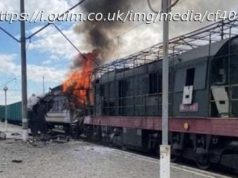Syria is the greatest humanitarian catastrophe since 1945.
Predictably President Trump tweeted out “mission accomplished” after bombing Syria. Clearly, he has not learned from President Bush’s premature boasting about Iraq. Neither is he the type to learn from past experience in strategic affairs.
If you look deeper, this mission was a wasted opportunity. It now turns out that Syria has used chemical weapons, in defiance of the Chemical Weapons Convention — 50 times during its civil war. After the U. S. strike a year ago it has again used these weapons another seven times.
Clearly, the allies and the Pentagon do not wish to become involved in a wider war and evidently they restrained Trump’s bellicose instincts that made a bad situation worse, as they invariably do.
This restraint also makes things worse because ineptly using force does not generate positive strategic outcomes, quite the contrary. It will embolden Moscow to believe that it has a free field of action in Syria and that its reckless threat to shoot at American ships succeeded in limiting U. S. power.
One rule of thumb is never to encourage Moscow in the delusion that its threats can intimidate the West on issues for which Moscow is not prepared to fight. Had the U. S. taken out Assad’s air defenses, there is little Moscow could or would have done despite its own reckless threats and its status as Assad’s main military backer. Indeed, it would be a salutary lesson for Russia, as was its attack on U. S. forces and allies that led to several hundred Russian fatalities in the private “Wagner” army, earlier this year.
It might have sobered up the Russian leadership about U. S. capability and resolve and the larger Western resolve. Instead, the Russian leadership will likely conclude that they have an open field for action in Syria and the West is only interested in meaningless demonstrations of power, not true strategic operations.
Moscow, having seen Assad’s success in chemical warfare, has launched similar an attack against Russian spies in Great Britain and continues to deny it stridently in the face of mounting evidence to the contrary. A strong Western response, coming on top of recent expulsions of diplomats and sanctions might have had a restraining effect on policymakers in Moscow.
Iran, too, may well draw a similar lesson. Taking out Assad’s air defenses would also be a useful blow to Iran, which is gearing up for more probes against Israel. Such a strike on Assad would have left his forces defenseless against the Israeli Air Force, something that undoubtedly would figure prominently in Tehran’s strategic calculus.
Lastly, the self-imposed limitations on this attack continue to display the growing U. S. disinterest in strategic action in the Middle East and unwillingness to determine what precisely it seeks to accomplish in regard to Syria and to other burning questions in this volatile region.
Bitter experience should teach us that if the U. S. abdicates its role as the primary guarantor of world order the ensuing result is either anarchy or the usurpation of that space by bad actors.
A venerable Russian proverb tells us that “a sacred space is never empty.” For Russia, Iran, ISIS, among others the Middle East is precisely such a sacred space that they must fill — especially if we retreat.
The results of those actors is the greatest humanitarian catastrophe since 1945. Under the circumstances of this catastrophe, Assad’s hands are free to continue butchering his people while we and our allies stand by impotently. On what basis can we say that the mission was accomplished?
Trump may talk tough and fling threats right and left but he acts like any other street corner bully — fearing resistance. His government remains incapable of genuine strategic perspective or action.
Stephen Blank, Ph. D., is a senior fellow at the American Foreign Policy Council, focused on the geopolitics and geostrategy of the former Soviet Union, Russia and Eurasia. He is a former professor of Russian National Security Studies and National Security Affairs at the Strategic Studies Institute of the U. S. Army War College. He is also a former MacArthur fellow at the U. S. Army War College.






